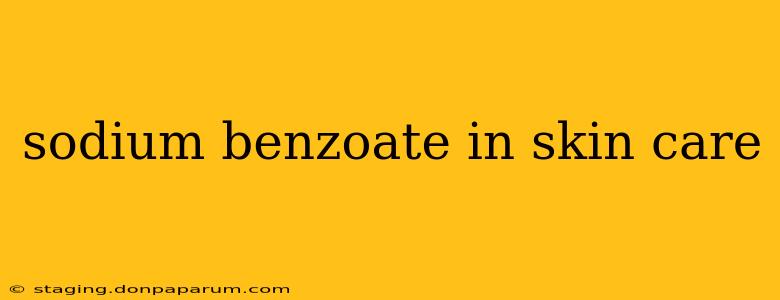Sodium benzoate. The name might sound intimidating, conjuring images of harsh chemicals and skin irritation. But is this common preservative truly a villain in your skincare routine, or is it unfairly maligned? Let's delve into the facts to understand sodium benzoate's role and safety profile in skincare products.
What is Sodium Benzoate?
Sodium benzoate is a salt of benzoic acid, a naturally occurring compound found in many plants like cranberries, prunes, and cinnamon. In skincare, it's primarily used as a preservative, preventing the growth of bacteria, yeast, and mold that can contaminate products and compromise their efficacy and safety. This crucial role safeguards your products from spoiling and protects your skin from potential harmful microorganisms.
How Does Sodium Benzoate Work?
Sodium benzoate works by inhibiting the growth of microorganisms. It disrupts their metabolic processes, preventing them from multiplying and causing spoilage or infection. Its effectiveness is enhanced in acidic environments (pH below 4.5), making it particularly suitable for products with a low pH. This is important because many skincare products have naturally acidic formulations.
Is Sodium Benzoate Safe for Skin?
The overwhelming scientific consensus supports the safe use of sodium benzoate in skincare at concentrations typically used in cosmetic products. Organizations like the FDA (Food and Drug Administration) and the Cosmetic Ingredient Review (CIR) have extensively reviewed its safety profile, concluding it's generally safe for topical application when used within the recommended limits.
However, individual sensitivities exist. Some people might experience mild irritation or allergic reactions. If you have sensitive skin or a known allergy to benzoates, it's crucial to patch-test any new product containing sodium benzoate before applying it liberally. A small amount applied to a hidden area (like the inside of your elbow) can help determine if you experience any adverse reactions.
Potential Side Effects (Rare):
While rare, potential side effects associated with sodium benzoate in skincare include:
- Mild irritation: Redness, itching, or burning at the application site.
- Allergic reactions: In individuals with sensitivities, more severe allergic reactions are possible, though uncommon.
- Interaction with other ingredients: In extremely rare cases, interactions with other ingredients in a formula might lead to unexpected reactions.
Sodium Benzoate vs. Other Preservatives:
Sodium benzoate is often compared to other preservatives, such as parabens. While both are effective preservatives, concerns surrounding parabens have led some consumers to seek paraben-free alternatives. Sodium benzoate presents a viable option for those seeking paraben-free skincare products. However, it's important to remember that no preservative is entirely without the potential for causing reactions in sensitive individuals.
Choosing Skincare Products with Sodium Benzoate:
When choosing skincare products containing sodium benzoate, look for reputable brands that use high-quality ingredients and adhere to strict manufacturing standards. Check the ingredient list to ensure the concentration of sodium benzoate falls within safe limits, and always prioritize patch testing if you have sensitive skin.
Conclusion:
Sodium benzoate serves a crucial function in maintaining the safety and efficacy of skincare products. While individual reactions are possible, it's generally recognized as a safe and effective preservative when used appropriately. By understanding its role and potential side effects, you can make informed choices about skincare products that meet your individual needs and preferences. Always prioritize patch testing and consult with a dermatologist if you experience any adverse reactions.

